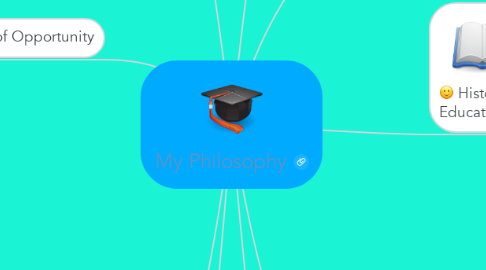
1. Philosophy of Education
1.1. Pragmatism
1.1.1. To learn, one has to doo
1.1.2. student led rooms/activities
1.1.3. students needs
1.2. Neo-Marxism
1.2.1. student led
1.2.2. society stressed
1.3. Idealism
1.3.1. Teacher led room
1.3.2. classic books
1.3.3. multiple perspectives
1.4. Realsim
1.4.1. teacher led
1.4.2. blank slate
1.4.3. conservative/traditional
1.5. Existentialism
1.5.1. Student led activies/rooms
1.5.2. They do their own thing
2. Schools as Organizations
2.1. NCLB
2.1.1. Have field knownledge
2.1.2. college degree
2.1.3. certified
2.2. Separate Social Organizations
2.2.1. They have a political structure and population
2.3. Schools have the ability to shape the lives of those who attend
2.3.1. private vs public differences in behavior
3. Equality of Opportunity
3.1. Stratification
3.1.1. Caste- agrarian society where social level is defined in terms of some strict criteria like race/religion
3.1.2. Estate- agrarian society where social level is defined by hierarchy of family worth
3.1.3. Class- industrial society defined by individual achievements by individuals, especially in economic pursuits
3.2. Achievement Gap
3.2.1. Economic measures between the performance of groups of students.
3.3. Coleman Study
3.3.1. Extensive survey of educational opportunity which was mandated by the Civil Rights Acts of 1964 (James Coleman)
3.3.1.1. Seen by some as an argument that schools don't matter, only families do.
3.3.1.2. Coleman's other work pushed the aspects of schools that did matter
4. Educational Reforms
4.1. Effective Teachers
4.1.1. Dedicated and talented teachers can make a difference!
4.1.2. If teachers expect kids to learn and grow, they do.
4.2. Federal Government in Education
4.2.1. No Child Left Behind
4.2.1.1. George W. Bush's peducational reform plan based on the standards movement.
4.2.2. Goals 2000
4.2.2.1. 1980s State led reform to increase high school graduation requirements, especially math and science.
4.2.3. Race to the Top
4.2.3.1. Barack Obama's educational reform plan meant to aid states in reaching the NCLB standards.
4.3. School Choice
4.3.1. Public
4.3.2. Private
4.3.3. Charter
5. Politics of Education
5.1. Conservative
5.1.1. Adam Snith
5.1.1.1. Ronald Reagan
5.2. Traditional/Progressive
5.2.1. Family Values
5.2.1.1. Integral Part of Society
6. History of Education
6.1. Funding
6.1.1. taxes
6.1.2. public vs private debate
6.2. Separate but Equal
6.2.1. Plessy vs Ferguson1896
6.3. Brown Vs Board of Ed 1954
6.3.1. Desegregation in schools
6.3.2. Civil rights movement
6.4. First Kindergarten 1855,First Public schools 1821
6.5. 1983 A Nation at Risk Article
6.6. 1975 Disabilities Ed Act
6.7. 2002 NCLB
7. Sociological Perspective
7.1. Functional Theory
7.1.1. Society viewed as a machine, one part works with others to keep the machine running
7.2. Interactional Theory
7.2.1. Relationships between students and teachers
7.3. Conflict Theory
7.3.1. Stronger groups directing weaker groups in society
7.4. Schooling Effects
7.4.1. Knowledge- Students gaining knowledge and skills to be used in life
7.4.2. Education- qualifies a students for future jobs
7.4.3. Mobility- Social mobility, climbing the social ladder through achievement
8. Curriculum and Pedagogy
8.1. Humanist
8.1.1. idealist- Liberal Arts
8.2. Social Efficiency
8.2.1. pragmatic/progressive- different strokes for different folks in Ed
8.3. Developmentalost
8.3.1. progressive- individual needs
8.4. Social Meliorist
8.4.1. social reconstruction- solving societies problems
8.5. Sociology
8.5.1. functionalist- Students key to a stable society
8.5.2. conflict- schools don't teach tolerance and respect, socail class based
8.6. Does the teacher or the system decide on what to teach, and how to teach it?
8.6.1. Benefits of teachers deciding
8.6.1.1. Teachers know best since they are in the classrooms everyday with their students, they also have been certified in their fields
8.6.2. Benefits of the system deciding
8.6.2.1. A uniform way of doing things
9. Educational Inequality
9.1. Unequal Achievement
9.1.1. Functionalist- "Just Society" based on individual work and talent
9.1.2. Conflict Theory- Schools should reproduce instead of take away inequality
9.1.3. Interactionist- We have to understand how people in institutions like schools and families on a daily basis in order to comprehend the factors explaining academic success or failure
9.2. Student Centered
9.2.1. Cultural Deprivation- Student start school already behind since they don't have books, cultural experiences,,,,etc
9.2.2. Genetic/Biological
9.2.3. Cultural Difference
9.2.3.1. African American children do worse in school because they adapt to their oppressed position in the class structure
9.2.3.2. Working class/Non white students resisting the dominant school cultures
9.2.3.3. Asian American families have greater academic expectations and standards
